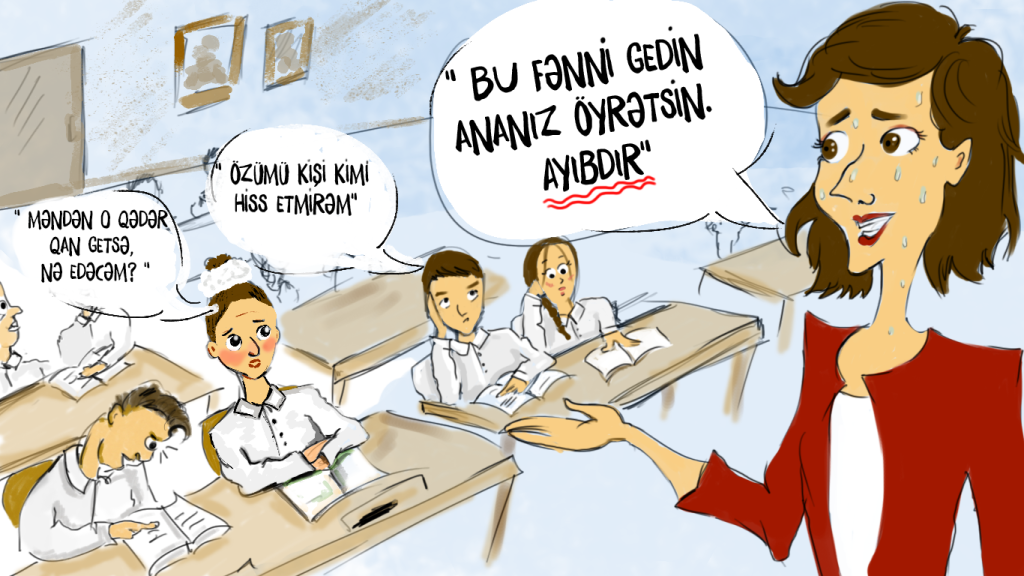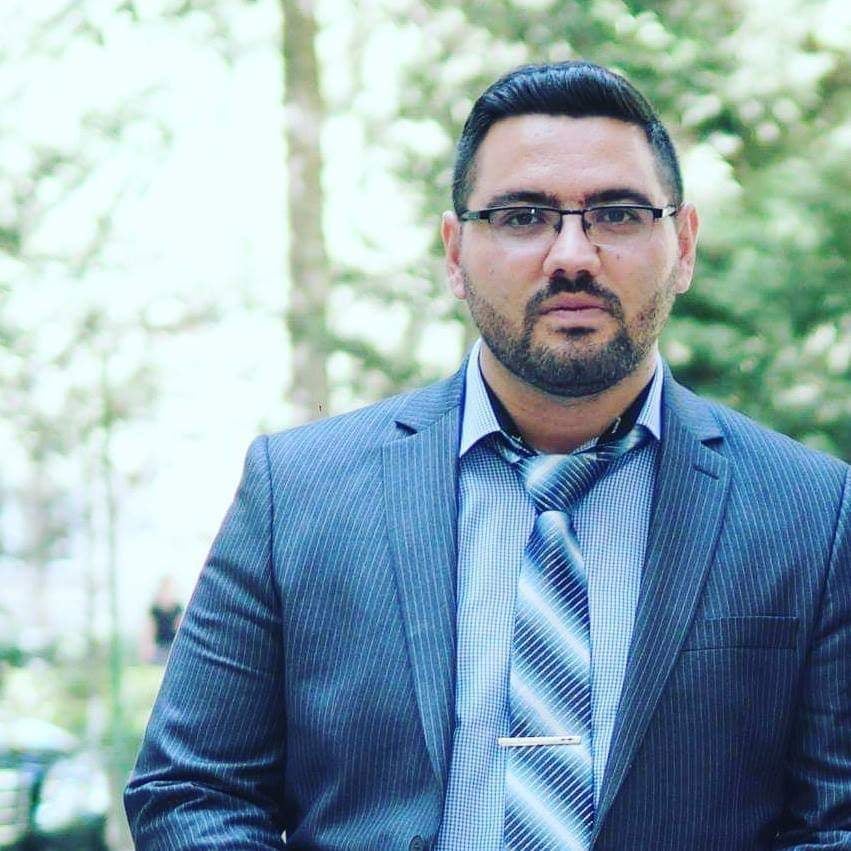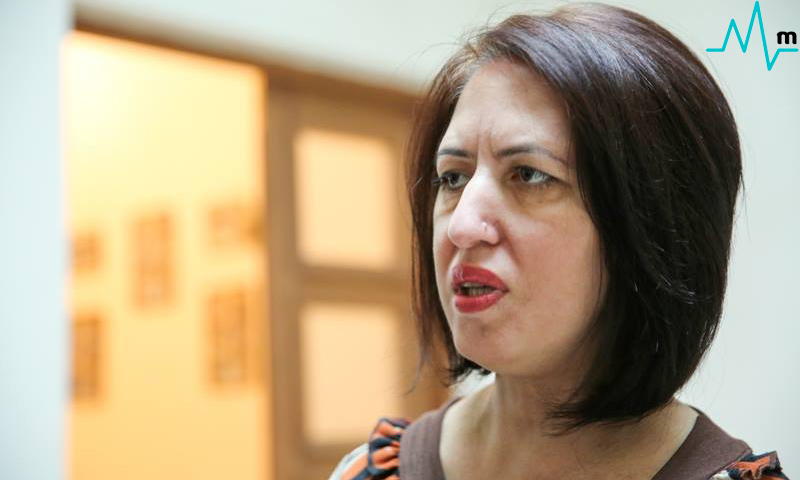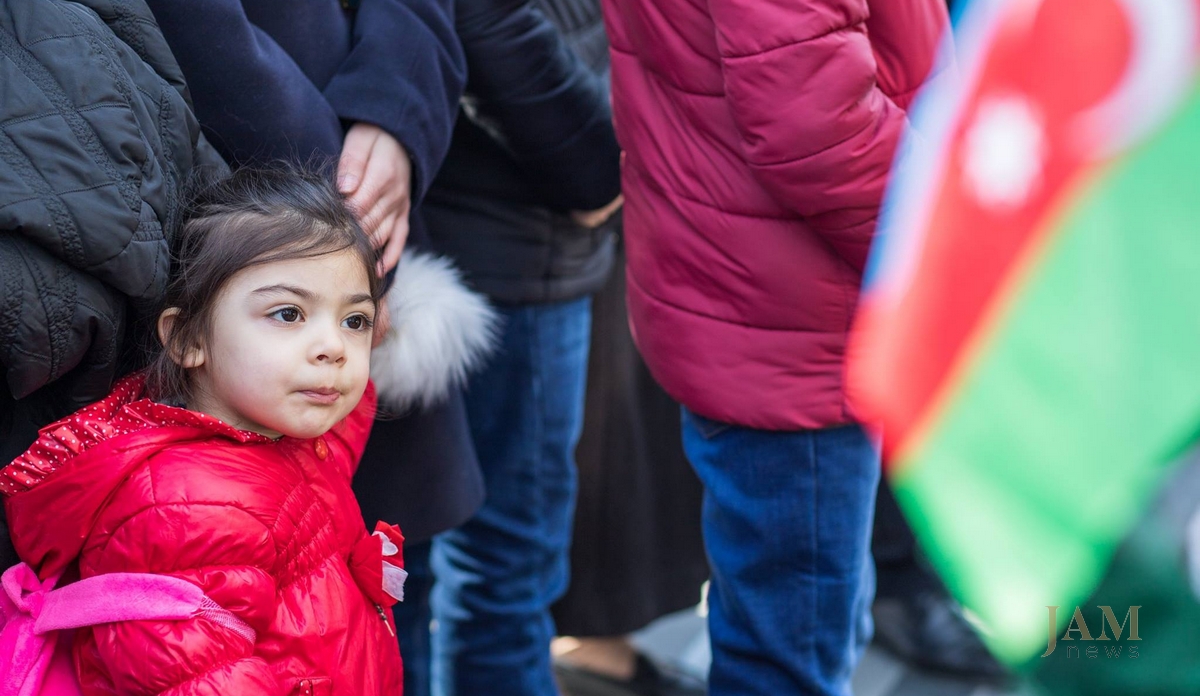Sex education in Azerbaijan: why is it taboo?
The subject of sex education in Azerbaijan
— Teacher, we got this one wrong.
— Let your mother explain it at home. Shameful!
Eleventh grade student Ali Rahimli (pseudonym – ed.) has this regrettable dialogue with his teacher. He says that the subject of sex education in Azerbaijan is not taught in schools; teachers treat this issue with indifference, and his peers end up believing all sorts of things about it.
- Asexuality: an orientation the South Caucasus has a particularly hard time with
- Why do Caucasus men need feminism
- Child sex abuse in Turkey

“They watch porn movies and teach others how to be a ‘man'”
Ali came to this school when he was in the seventh grade. It was hard to adapt to the new environment, in spite of his efforts.
“When I came to this school, I realized the environment here is different. Most of the boys skip classes, try to act tough. And the girls try to be ‘good’,” Ali says.
Ali, who is concerned about these stereotypes among youth, notes that even the adults do it:
“Once I heard a music teacher say to a boy during a lesson: “Why are you whining like a homo?” Education is a value that unites us in one institution. Here teachers treat students based on personal stereotypes.”
In 2015, the country’s secondary schools introduced the subject of sex education as a pilot project, and it was announced that in 2018 it would be extended to all schools in the country. The subject was to be taught by biology teachers under the rubric “Knowledge of Life” in order to preserve the demographic situation, prevent infectious diseases and teach children about reproductive health.
But four years have passed since then and the subject is still not taught in schools. The subject of sex education in Azerbaijan is still taboo.
At the moment it is not known what happened to the project, nor whether the subject of sexual education is taught in schools on an official basis. Despite our inquiry to the Ministry of Science and Education, we did not receive a response.
Remembering the experience, Ali smiles at first but then sighs with regret. He says that due to the carelessness of parents and teachers, his peers fall under bad influences, and he himself faces peer pressure:
“Boys are more aware of sexual matters than girls. Although covered up, they also joke about these topics. But how much they are aware of these issues is doubtful. When I don’t take part in these conversations, they call me a”p-ssy” or gay.
I don’t know what the girls’ situation is, but boys watch porn and present themselves to others as the men in those videos. My classmates make fun of me, saying that my penis is small, and when they did the circumcision, it was cut off at the root. It’s really depressing.”
Ali believes that the reason for all this is the lack of awareness of young men in matters of sex education, both on the part of the school and parents.
“There is an anatomy section in a biology textbook. This section provides information about the structure of the genital organs of men and women. The teacher passed through this paragraph in silence. Without even saying a word. And I asked why we didn’t go through that paragraph. And she got angry, and answered literally like this: “Let mom teach at home.” The sounds of laughter came from the back. In the class, only 1-2 people supported me. And the boys began to joke: “Ali, if you want to learn, we will teach you.”
Although there are no such subjects at school, an 11th grade student thinks that at least once a month, doctors and psychologists should have conversations with them:
“I am already a graduate. But the situation of those who are younger than me is even more deplorable. Due to insulting jokes addressed to me, I wore loose trousers for a long time, made friends with them, so that they would also consider me a “man”. If things are like this for us boys, I can’t imagine how it is for girls. I heard that some even get pregnant due to ignorance.”
According to the State Statistics Committee, in 2021, the number of women in Azerbaijan who had an abortion increased by 35% compared to a year earlier and amounted to 46,877 people.
This is the highest figure in the history of observations in the country. 5.2% who had an abortion, i.e. 2,428 people, women aged 15 to 19. The indicator in this age segment has grown by 87 percent over the year!
In 2020, 1917 children in Azerbaijan were born to women under the age of 18.
“Once a gynecologist told the girls about menstruation, and that’s all”
Leyla Hajiyeva, an eleventh grade student, believes that for girls who cannot talk about these topics with family and friends, it would be helpful to learn about it at school:
“I, like most of my peers, cannot talk about such topics in the family. They explain things to us only after our first period. But most mothers are content with only the knowledge that the girl needs in that case. So it would be good if they talked about it in schools.”
Thhough she deplores teachers who refuse to talk about these topics, she also understands them. In her opinion, teachers are also embarrassed by pressure from others, and try to avoid such topics:
“In our school, they didn’t talk about sex education. The teacher told us that if they talk about these topics, the boys will start to pick on the girls.
One day, the school held an event exclusively for girls. And there gynecologists offered some superficial information. After that event, we did not talk about it with anyone.”
“Unwritten mental rules block the process”

Education expert Elmin Nuri doesn’t consider it likely that a separate subject on sex education and gender topics will be taught in general education schools in Azerbaijan.
“Let’s say the Ministry of Education took this step. Immediately there will be a problem with how to approach it. We have very few teachers who could teach the subject of sex education. Some might say that educators in other subjects can take a course, get certified, and teach that subject. But this is not a good way out. This area requires specialized knowledge. These teachers must be prepared psychologically, from a pedagogical and social point of view,” he says.
Elmin Nouri considers sex education not a separate subject, but a combination of other core subjects:
“This subject combines such important areas as sociology, psychology, biology, etc. Unfortunately, based on our mental approach, the possibility of teaching such a separate subject is unlikely. There are several questions of interest to people: from what class should this training begin, from what aspect should one approach teaching? Is it necessary to separate the classes into boys and girls during this lesson?”
In the biology textbook for high school, these topics are reflected, but in some cases they are not covered. The teacher does not understand the topic, or is embarrassed to talk about it. But there is nothing wrong with this subject. It’s just unwritten mental rules that prevent it.”
“Teachers are not far from gender stereotypes”

According to gender expert Ainur Veysalova, Azerbaijan has joined international conventions on human rights. But teachers who are not far from gender stereotypes complicate the issue:
“If there is such a paragraph [on the subject of sex] in the textbook, the teacher must go through it. At the same time, the teacher must take into account the psychology of adolescents experiencing a transitional age, and create conditions under which students can easily master this knowledge. That way, students can take an active part in discussions and find themselves. These steps show that the teacher is not reinforcing gender stereotypes. If seminars and trainings are periodically held with teachers, this subject would become easier.”
***
According to Ali, the lack of education of Azerbaijani women in such matters also harms the foundations of the family. He would like to see the birth rate among young women slow down, which would require changes in the educational system:
“There is a page on Instagram called “Women’s Club”. When you look at this page, you see that even thirty-year-old women do not know what masturbation is. They have no idea about preventing pregnancy. Because because of the stereotypes in society, they were not taught this either at school or in the family. How will they raise their children? I really hope that at least in the future the necessary steps will be taken in this direction.”




















